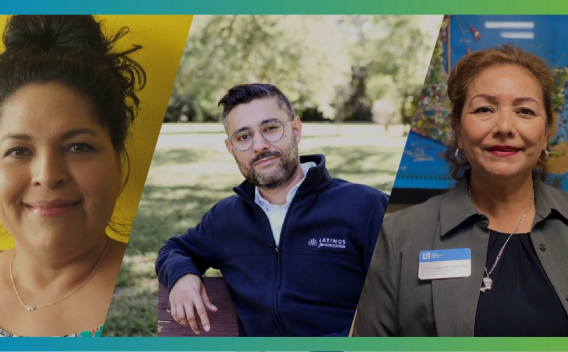By
Published
June 29, 2020
Tags
“When I was seven, I told my mom my dreams and goals. I remember her sad face when she told me, ‘Aye mija, all that is nearly impossible because you are not from here. You are illegal so we get the unwanted jobs. We came for a better life, but I am sorry. I just can’t give you this.’ That day gave me a reason to fight and to beat the odds.” - Tulsa Community College student, My Dream Scholarship recipient
“What pushed me most to pursue a college education is my family. …I want to go to college because I want to be the one that finally breaks the cycle of poverty that has entrapped my family for so long, so that I may become valuable to society.”College student, My Dream Scholarship recipient
These powerful words were written by two applicants for the My Dream/Mi Sueño Scholarship, a fund that provides opportunities for undocumented, graduating high school seniors in Tulsa and Rogers Counties to attend Tulsa Community College at no cost.
Last week, the United States Supreme Court ruled to protect the Deferred Action for Childhood Arrivals (DACA) program, ensuring that these students and the more than 650,000 young people like them—known as DREAMers—will no longer live under constant threat of deportation. The ruling returns DACA to its original form, allowing for application renewals and opening up new possibilities for DREAMers to apply for DACA status. It is a victory that potentially changes the future for the 98,000 student DREAMers who graduate from U.S. high schools every year, and who will now have the security to pursue long-term academic success.
In 2012, DACA was created by executive order to allow immigrants brought to the U.S. as children to work and study without fear of family separation or deportation. In September 2017, the Trump Administration issued an executive order to end the program, putting young immigrants benefitting from DACA, as well as any potential new applicants, at risk.
DREAMers are incredibly resilient individuals. More than 90 percent of DACA recipients are employed, and nearly half are enrolled in school. With DACA protections, unemployment among DREAMers has decreased 3.8 percent, while 10 percent of the DREAMer population has entered the labor force. DREAMers are medical professionals, community advocates, teachers, lawyers, scientists and so much more.
SCOTUS’ decision creates temporary stability and is a crucial step forward toward a longer-term policy that would safeguard DREAMers’ achievements, ambitions and future in the United States. For K-12 students, in particular, the DACA ruling lays out endless possibilities of opportunities for work, family security and higher education.
Among the initiatives we invest in that support DREAMers in completing K-12 education and pursuing higher learning is the My Dream/Mi Sueño Scholarship program.Since 2011, more than 350 DACA recipients have received the My Dream/Mi Sueño Scholarship in Tulsa. Despite the daily stress they face, the talented students we have met stay in school, graduate at high rates, and report success in achieving their goals, planning for the future and leading meaningful, purposeful lives.
We have also had the opportunity, through our investment in Teach For America’s DACA initiative, to see the impact of the more than 280 DACAmented K-12 educators it has put into classrooms since 2013. These teachers provide culturally responsive classrooms for DREAMer students, and the powerful lived experiences they bring enhances their ability to guide and spearhead transformative change for their students.
As our partner and collaborator Teach for America CEO Elisa Villanueva Beard saidin response to the SCOTUS ruling, “Every day, we see DACAmented educators demonstrate profound courage, resilience, and leadership, and their contributions have never been more important to our country.”
Still, even with SCOTUS’ ruling, undocumented Americans continue to face marginalization, particularly as the ongoing pandemic-related economic crises worsen. Though Congress passed the CARES Act this year, the Administration excluded undocumented families from receiving direct emergency payments. And the United States Department of Education excluded undocumented students from receiving emergency assistance available to students enrolled in college this spring.
In response, we have provided support to the California Immigrant Resilience Fund and the New Jersey Pandemic Relief Fund, both of which are providing direct cash relief to undocumented residents that have been hardest hit by the COVID-19 pandemic. For families with K-12 students, this money can be used to purchase items critical for distance learning or to ensure students are well-nourished and ready to learn as they begin schoolwork each day. In Tulsa, we have also provided direct cash assistance to over 200 undocumented students enrolled at Tulsa Community College and Oklahoma State University.
As our chair, Stacy Schusterman, said when supporting these efforts: “Despite their vital contributions to our country’s economy, undocumented residents are ineligible for support from the federal government during this crisis. Our Foundation believes that those of us with the resources have the obligation to step up and help those who need it most right now. In addition to support we are giving to US citizens through GiveDirectly and other organizations, we are proud to support these efforts to provide direct cash assistance to people who are undocumented so they can meet their greatest needs, and we hope others will join in providing support too.”
This decision by the Supreme Court to protect DACA is only a temporary measure. Permanent protections will not exist unless Congress passes legislation to protect immigrants—and the talents, innovation and culture they bring—by halting deportations against young Americans, establishing a path to citizenship for DREAMers, accepting new DACA applications and offering in-state tuition rates for institutions of higher learning.
As our colleague Michael DuPont, a Senior Program Officer on our Tulsa Grantmaking team, wrote in a piece for Tulsa World in June 2018: “These young people are striving to earn a college degree as a way to end the cycle of poverty as well as to honor and support their families. Their motivations are exemplary and relatable as we all desire a fair chance to improve our own circumstances. Although immigration reform is a complex issue, we must be mindful of the human impact of our policy decisions, and rather than resort to dehumanizing rhetoric or policies that harm families, we should look for solutions that, at the very least, allow these young people to become citizens and have the opportunity to realize the American Dream.”





